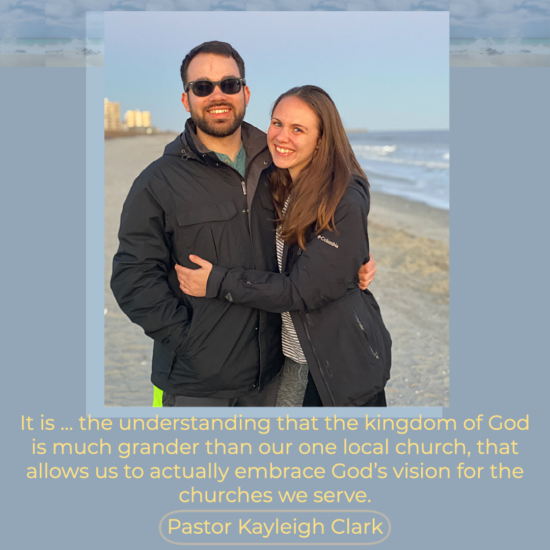 “I want you to picture My kingdom in Uniontown.” The words echoed around me during a time of prayer, an unmistakable message to my heart from the still, small voice of God. In that moment I thought I knew what those words meant. It seemed to me an invitation to step into the new calling of lead pastor, something vastly different from the role I had previously held as family ministries pastor. I took the step, embraced this new season, and as I did so, I discovered that I had only begun to understand this message from God to my heart.
“I want you to picture My kingdom in Uniontown.” The words echoed around me during a time of prayer, an unmistakable message to my heart from the still, small voice of God. In that moment I thought I knew what those words meant. It seemed to me an invitation to step into the new calling of lead pastor, something vastly different from the role I had previously held as family ministries pastor. I took the step, embraced this new season, and as I did so, I discovered that I had only begun to understand this message from God to my heart.
As I sought to live into this new role and embrace the calling of lead pastor, I kept the words “picture my kingdom” close to my heart. Soon, this message that had provided me comfort and assurance became words that challenged and stretched me. Truthfully, if I was going to seek God’s kingdom where I was, it meant first and foremost that God needed to be King. Jesus needed to be Lord. This was an easy enough concept to live out when God’s idea of how I should be seeking His kingdom matched my own preconceptions of what that meant. Then COVID hit, followed by the cry for justice from our Black brothers and sisters, paired with devastating local violence in the city where I had been asked to picture God’s kingdom. As each crisis came crashing down, God began to dismantle my small ideas of what it meant to picture God’s kingdom.
When I first began to articulate the call to picture God’s kingdom in Uniontown, it had everything to do with the success of the church I was pastoring. I equated picturing the kingdom with imagining the local church I was serving living into a missional identity. I saw this little church growing as it participated in incarnational ministry within its neighborhood. I dreamed up what I believed should be the future of this church for the sake of the kingdom. They were not bad dreams. In fact, they were hopeful and had strong theological backing. They were the goals all the books on missional churches and movements told me to work toward. Yet, as the various tragedies erupted around me, I realized I had painted much too small a picture of the kingdom of God. I had spent so much time imagining a future for this local church, that I had forgotten that my call was not to imagine one church, but to picture the kingdom. As I began to cry out to God for what it meant to live into that calling in the midst of so much suffering, I realized that my hands were closed too tightly around a particular dream for one church. If I would not surrender those dreams and visions, I would not be able to fully picture His kingdom. I had tried to live into the kingdom of God without allowing Jesus to be King.
It is tempting to think that because our visions for the local church we serve are biblical, and hopeful, and Christ-centered that we have allowed Jesus to be King and Lord of those visions. However, what happens when God shows us a picture of His kingdom at work in our city, and that picture calls our church in a direction that is different from the well-articulated vision we thought we were supposed to be moving toward? What happens when the glory of the kingdom calls our churches into a place where they don’t see “success” as we would measure it? In those moments, are we willing to lay down what we believe the future of our church should be so that our hands might be open to receive God’s vision and more fully live into His kingdom? All throughout Scripture, the kingdom of God is described in ways that surprise people, and God is almost always calling His prophets and leaders into ministry that is unexpected. God tells Jeremiah to prophecy in ways that both build up and tear down (Jeremiah 1:10) yet rarely do our visions of our local church involve tearing down. Would we walk toward that if that was what would bring the most glory to the kingdom?
It is this surrender of our own ideas of the future, the understanding that the kingdom of God is much grander than our one local church, that allows us to actually embrace God’s vision for the churches we serve. When we begin to live into His vision for the local church, we get to catch a glimpse of the way His kingdom is breaking into our neighborhoods and cities. Not only that, but we get to be a part of it! We get to see reconciliation conversations take place in the middle of clergy meetings. We get to witness healing at prayer vigils made possible by the partnerships of multiple churches. We find ourselves speaking life to a hurting community longing for justice. Most of all, we worry less about the future of our own local churches, and begin to yearn most for whatever brings the greatest glory to the kingdom of God.
Matthew 6:31-33 reminds us, “So do not worry, saying ‘What shall we eat?’ or ‘What shall we wear?’ For the pagans run after all these things, and your heavenly Father knows that you need them. But seek first His kingdom and His righteousness, and all these things will be given to you as well.” I have come to understand that the call not to worry applies not only to clothes and food, but also to desired “successes” of the local church. Today I do not need to worry saying, “What will the church’s future look like?” “Will people engage in the mission? Will they buy in?” “Will tithing return to normal?” “Will people engage like they did pre-COVID?” No, I do not need to worry about any of it, for this is my Father’s church. I am called instead to seek His kingdom. When I do this, the peace of Christ, which passes all understanding, guards my heart and mind so that I do not grip too tightly to my ideas of how my local church should live into the kingdom. Instead, I am openhanded, ready to receive God’s vision of the role this church will play. When I seek the kingdom first, trust comes easier, and I am able to marvel at the way in which God is moving in, through, and far beyond my church. When I do this, I find I truly can picture the kingdom of God.
About the Author
Kayleigh Clark currently serves as the lead pastor of the Uniontown Free Methodist Church. She and her husband, Nate, spent their first year of marriage moving to a new state, starting new jobs, buying a home, and living through a quarantine — and they still love each other as much as the day they got married, maybe even more! She is a graduate of Eastern Nazarene College and Northeastern Seminary.
